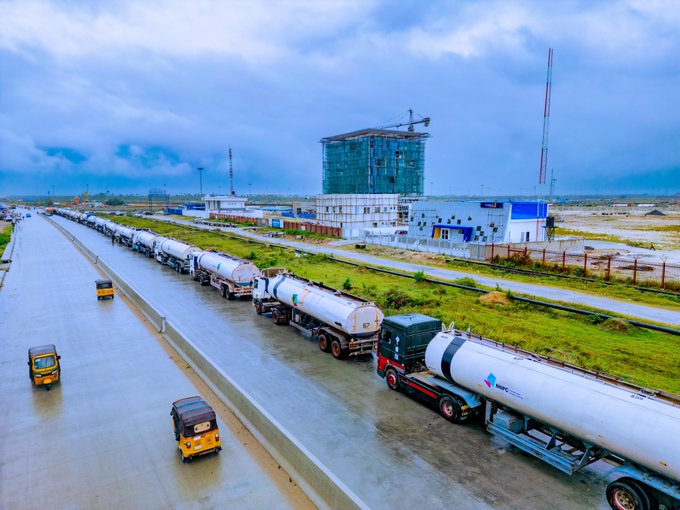The Petroleum Products Retail Outlets Owners Association of Nigeria (PETROAN) has called on the Federal Government to approve an emergency ₦100 billion intervention fund aimed at stabilizing the petroleum products market, ensuring affordable fuel prices for Nigerians, and preventing widespread job losses within the sector.
Speaking candidly on Arise TV’s This Morning Show on Monday, Dr. Billy Gillis-Harry, President of PETROAN, explained that the requested fund was crucial to alleviating the soaring operational costs in the industry. “The request for ₦100 billion intervention is necessary to help cushion the high cost of doing business in the petroleum sector,” Dr. Gillis-Harry emphasized. “This financial relief would enable us to make petroleum products more accessible and affordable for the average Nigerian.”
Dr. Gillis-Harry’s comments come in response to the ripple effects of the recent removal of the petrol subsidy, which has escalated the price of fuel and created significant challenges for petroleum marketers. The association’s president pointed out that the high cost of capital—currently ranging between 36 and 40 percent—has exacerbated financial pressure on retailers, leading to rising operational costs. “The high cost of money is squeezing us at every level,” he noted, urging the government to swiftly approve the funding as part of its annual budget, which he described as a small but impactful allocation.
“Every year, the federal government allocates funds for various interventions. We believe that ₦100 billion is a reasonable portion that can go a long way to stabilizing the market,” Dr. Gillis-Harry added. “It would ease the burden on us and help maintain a steady supply of petroleum products across the country.”
This intervention request is in response to a dire situation in the downstream petroleum sector, where businesses are under severe pressure following the government’s decision to remove the fuel subsidy, a measure aimed at reducing government spending but which has led to a sharp increase in fuel prices. PETROAN, representing thousands of fuel marketers across the country, has warned that without immediate financial relief, up to 10,000 businesses in the sector could be forced to shut down, resulting in massive job losses.
In a statement released over the weekend, PETROAN outlined its concerns, emphasizing the urgency of the situation. “If the government does not act swiftly, the closure of thousands of retail outlets is imminent. This will not only worsen the unemployment crisis but also lead to supply shortages, further driving up prices and creating more hardship for Nigerians,” the statement read.
The group also highlighted the ripple effects that job losses in the petroleum sector would have on the broader economy, noting that many families depend on the livelihoods generated by the oil and gas industry. PETROAN has thus urged President Bola Tinubu to prioritize this request, ensuring that the intervention fund is quickly approved and disbursed.
The proposed ₦100 billion intervention is also seen as a way to help stabilize the petroleum market, keeping fuel prices at a manageable level for consumers. With fuel prices already reaching unprecedented heights, the association argues that the absence of such support could lead to even higher costs, further inflating the cost of living for Nigerians.
“We hope the government will take this very seriously,” Dr. Gillis-Harry said during the TV interview. “This is not just about marketers; it’s about Nigerians, the everyday person who struggles to fill their tanks. This intervention would ensure that petroleum products remain within reach for everyone, from individuals to businesses.”
The need for the intervention fund has been further underscored by the ongoing challenges within Nigeria’s oil and gas downstream sector. Despite last year’s deregulation of fuel prices, PETROAN remains optimistic about the future of the industry, pointing to infrastructure investments and growth in the Liquefied Petroleum Gas (LPG) market as signs of potential stability. The group has expressed confidence that with the right support from the government, the sector will continue to grow and contribute significantly to Nigeria’s economy.
“2024 is shaping up to be a pivotal year for the oil and gas sector,” PETROAN said in its statement. “Despite the challenges, the market has shown resilience, with improvements in LPG infrastructure and other vital areas. However, without immediate intervention, these gains could be lost, and the industry’s potential for growth could be stunted.”
Petroleum marketers are not the only ones feeling the effects of the subsidy removal and rising operational costs. Consumers across Nigeria have been forced to contend with soaring fuel prices, which have had a ripple effect on the prices of essential goods and services, adding to the financial strain on households. With transportation costs skyrocketing and businesses struggling to absorb the additional costs, Nigerians are increasingly feeling the burden of the fuel crisis.
The government has already made efforts to address some of the challenges posed by the subsidy removal, including implementing a palliative program for vulnerable Nigerians and increasing investments in local refining capacity. However, PETROAN argues that these efforts will be insufficient unless a more targeted intervention is made to assist petroleum marketers and ensure a steady, affordable supply of fuel.
“The removal of the fuel subsidy was a difficult decision, but it was necessary,” Dr. Gillis-Harry acknowledged. “However, the transition has been painful, and without a clear plan to support the stakeholders in the value chain, especially the marketers, we risk a total collapse of the system. We need this intervention now to keep things running smoothly.”
As the government continues to grapple with the economic fallout from the subsidy removal, it remains to be seen whether PETROAN’s call for ₦100 billion will be heeded. However, given the increasing pressure from marketers and the dire consequences of inaction, it is clear that urgent intervention is needed to prevent further disruptions in the petroleum sector and protect the livelihoods of Nigerians who rely on affordable fuel for their daily lives. In the meantime, as Dr. Gillis-Harry aptly put it, “Time is of the essence. The longer we wait, the greater the risk to our economy and the people who depend on us.”

